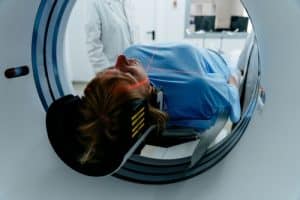Complications Related to Breast Implants
While breast augmentation can enhance confidence and self-esteem, it’s crucial to acknowledge potential complications that may arise.
Following are the common complications encountered in Breast Implants.
- Implants rupture/leak
- Breast pain and nipple discharge
- Breast implant associated-anaplastic large cell Lymphoma (a type of non-Hodgkin’s Lymphoma)
- Connective tissue disease, breast cancer
- Breast tissue atrophy – thinning and shrinking of the skin
- Capsular contractures around the implant
- Displacement or Malposition
- Inflammation/Irritation
Feel free to see an extensive list of complications related to Breast Implants.
Please inform the professional about the type of breast implant you have, whether it is a fat transfer breast implant or another kind.
The Need for Breast Implant MRI
Regular screenings, particularly through MRI scans, play a pivotal role in ensuring the ongoing health of breast implants. Understanding the importance of routine imaging is key to identifying and addressing potential concerns before they escalate.
According to the latest FDA guidelines,
“It is recommended that you have periodic imaging (e.g., MRI, ultrasound) of your silicone gel-filled breast implants to screen for implant rupture regardless of whether your implants are for cosmetic augmentation or reconstruction. These recommendations do not replace other additional imaging that may be required depending on your medical history or circumstances. Even if you have no symptoms, you should have your first ultrasound or MRI at 5-6 years after your initial implant surgery and then every 2-3 years thereafter.”

Symptoms to Watch Out For:
- Breast pain
- Chronic fatigue
- Loss of sensation around the breast
- Joint & muscle pain
- Breast asymmetry
- Redness & rashes
- Sleep disturbance
- Dry mouth and dry eyes
- Hair loss
- Gastrointestinal problems
Breast implant illness symptoms can appear any time after implant surgery — some people start to develop breast implant illness symptoms immediately, while some develop them years later.
Should you notice any of the symptoms mentioned, prompt consultation with a medical professional is imperative. Early detection and intervention can make a significant difference in the outcome.
The process to Get Breast Implant MRI
- Book your scan – schedule your scan online in a few easy steps
- Obtain a Referral – Request a referral from your doctor or obtain one virtually through our physician partners
- Get Your Breast Implant MRI Scan – Our skilled technologists will guide you through the screening examination
- Review Your Results with an Expert – A detailed report will be provided to you, and a consultation with an experienced radiologist to go over your results
What to Expect During the Scan
- In general, it takes around 45 minutes for the entire scan, including 25-30 minutes on the exam table.
- You will be asked to wear a gown during the exam. No clothing with metal can be worn during the scan.
- A nurse or technologist will start an IV so that the contrast can be injected with a power injector at a specific rate and timing halfway through the exam.
- You will be asked to lie on your stomach for the exam with your breasts in a cupped device. There is no compression of the breasts during a routine MRI as with a mammogram.
- It is normal to experience sensations such as coolness or trickling in your arm, followed by warmth or flushing in your face, chest, abdomen, and pelvis.
Remember, your well-cared-for breast implants not only enhance your physical appearance but also contribute to your overall confidence and well-being. Embrace the journey of self-care, and empower yourself with the knowledge to keep your breast implants in optimal condition for years to come.






